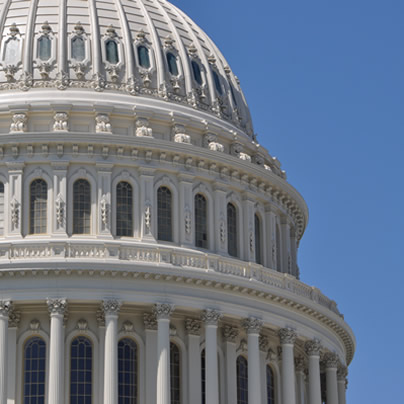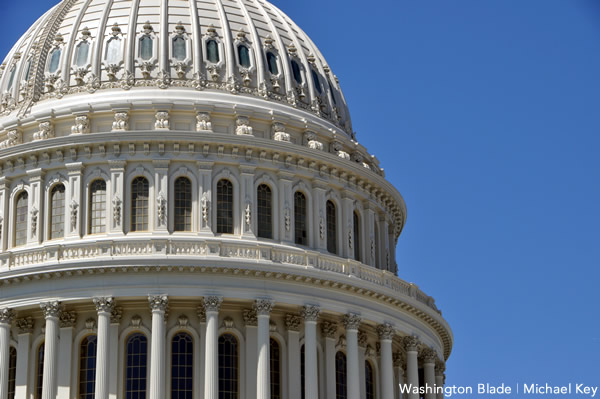News
Defense bill contains gay-related provisions
Expanded conscience protections; sodomy ban repealed in military code


The defense authorization passed by Congress includes gay-related provisions. (Washington Blade file photo by Michael Key)
The U.S. Congress passed major defense budget legislation on Thursday that includes provisions related to the LGBT community — both good and bad — in the aftermath of “Don’t Ask, Don’t Tell.”
The fiscal year 2014 defense authorization bill contains an expansion of the conscience protections for service members under current law, but also repeals the sodomy ban under military law and calls for a report on HIV policy within the U.S. military.
The Senate approved late Thursday by a vote of 84-15 a $630 billion version of the bill, which primarily reauthorizes pay for troops and funding for military programs. The House already approved the legislation, so it’s heading to President Obama’s desk.
Sen. Carl Levin (D-Mich.), the retiring chair of the Senate Armed Services Committee, issued a statement upon passage of the legislation praising the bipartisan nature of its approval.
“Tonight we passed legislation that is good for our national security, and for the men and women who protect us and their families,” Levin said. “The Senate vote is a strong bipartisan statement that, despite our differences, we can come together and accomplish important business for the good of the country.”
Under Section 532, the legislation contains an expansion of the conscience provision that was enacted as part of last year’s defense authorization bill. Under this provision, the armed services shall accommodate service members’ expression of their beliefs — unless it would have an adverse impact on military readiness or good order and discipline.
The language was inserted by Sen. Mike Lee (R-Utah) during the Senate Armed Services Committee markup of the fiscal year 2014 defense authorization. It’s along the lines of a conscience amendment submitted by Rep. Mike Fleming (R-La.) during the House Armed Services Committee markup of its version of the bill, but not quite as strong. LGBT advocates decried the House version of the amendment as a means to enable service members to discriminate and harass their gay colleagues.
A related provision, Section 533, instructs the Inspector General of the Department of Defense to submit a report to Congress no longer than 18 months after the bill is signed into law on incidents of adverse personnel actions or discrimination against troops based on their moral beliefs.
Tony Perkins, president of the anti-gay Family Research Council, praised Congress in a statement over inclusion of the provision, which he said is a means for “protecting the right of service members to freely practice and express their faith.”
“Congress acted appropriately after investigating numerous incidents involving service members who have had their careers threatened, and harassed simply for practicing their faith in a real and tangible way,” Perkins said. “The religious liberty violations have grown so frequent in recent years leading many service members to report being too fearful to share their faith.”
After the enactment of the earlier conscience provision under the previous defense authorization bill, Obama said the Pentagon assured him the language wouldn’t change how the armed forces operated. The Defense Department didn’t respond to the Washington Blade’s request for comment on how implementation will work this time around.
Ian Thompson, legislative representative of the American Civil Liberties Union, said the inclusion of the conscience provision in the defense authorization bill was unnecessary.
“The ACLU believes that the Constitution and existing laws and regulations already offer all members of the Armed Forces, including chaplains, strong protections for their religious beliefs,” Thompson said.
Fred Sainz, the Human Rights Campaign’s vice president of communications, expressed a similar sentiment that the provision is unnecessary because service members’ religious views are already protected under current policy.
“Although this amendment is unnecessary, Congress dropped a different version adopted by the House of Representatives that would have been truly harmful, requiring the military to accommodate beliefs, actions, and speech of service members unless the armed forces could prove ‘actual harm’ to good order and discipline,” Sainz said.
But the legislation as a whole also contains positive language sought by LGBT advocates in the aftermath of “Don’t Ask, Don’t Tell” repeal. Among these provisions is Section 1707 — repeal of the ban on sodomy for gay and straight service members under Article 125 of the Uniform Code of Military Justice. The provision was added by Sen. Mark Udall (D-Colo.).
In its place, the legislation inserts into military code a provision making “unnatural carnal copulation” with another person “by force” subject to a court martial. The provision also reasserts the ban on bestiality in military code.
Although the sodomy ban was rarely enforced for service members engaging in consensual sex in private, it has remained on the books and been used to prosecute troops in combination with additional infractions.
ACLU’s Thompson said the repeal of the sodomy ban is an important step forward to guarantee the liberty of service members — gay and straight — in the aftermath of “Don’t Ask, Don’t Tell” repeal.
“This is a welcome and overdue step forward that respects the liberty and privacy of all service members, and is especially significant for gay and lesbian service members whose intimate relationships, including marriages, were labeled a violation of military criminal law,” Thompson said. “Removing this stigmatizing and discriminatory provision from the Uniform Code of Military Justice advances the promise of equal treatment for all military personnel.”
Additionally, under Section 572, the legislation directs the Pentagon to submit a report to Congress no later than 180 days after the bill is signed into law on personnel policies regarding service members with HIV or Hepatitis B. The bill directs the Pentagon to include a description of the policies as well as related retention, deployment and disciplinary actions as well as an assessment of whether these policies are evidence-based and medically accurate.
According to the LGBT military group SPART*A, service members become non-deployable once they’re discovered to have HIV; can’t commission as an officer or warrant officer; can’t fly aircraft or work in any jobs requiring a flight physical; are restricted to stateside duty assignments (with the exception of the Navy); and are not eligible for special schools such as Ranger, Special Forces or other special ops jobs.
Thompson said the provision is welcome because it will examine whether the military’s current HIV policy is appropriate or outdated.
“This review is welcome and overdue becausemany of our laws, policies, and regulations regarding HIV were written at a time when we knew far less about the routes and risks of HIV transmission, and prior to the development of effective HIV treatment,” Thompson said.
Another important non-LGBT provision in the defense authorization bill replaces foreign transfer restrictions in current law to enable President Obama to close the detention facility in Guantanamo Bay. The bill also seeks to aid victims of sexual assault in the military by criminalizing retaliation against victims who report it, preventing military commanders from overturning jury convictions and protecting victims of sexual assault from abusive treatment during pre-trial proceedings.
The LGBT group Freedom to Work had said insertion of the Employment Non-Discrimination Act into the defense authorization bill could be a viable way to pass the measure. However, prior to ENDA’s passage in the Senate, Senate Majority Leader Harry Reid (D-Nev.) told the Washington Blade such inclusion wasn’t a viable option because he didn’t know if the larger defense bill would pass.
On Thursday, White House Press Secretary Jay Carney issued a statement saying the administration has concerns with certain aspects of the legislation, but supports it overall.
“Although the bill includes a number of provisions that restrict or limit the Defense Department’s ability to align military capabilities and force structure with the President’s strategy and implement certain efficiencies, overall the Administration is pleased with the modifications and improvements contained in the bill that address most of the Administration’s significant objections with earlier versions regarding these issues,” Carney said. “The Administration supports passage of the legislation.”
District of Columbia
LGBTQ budget advocates fight for D.C. resources in a tough fiscal year
‘Trying to preserve life-saving services’ amid $1 billion cut

The months and days leading up to June are especially busy for LGBTQ Washingtonians. For one group, the DC LGBT Budget Coalition, which works year-round to ensure LGBTQ residents are represented and financially supported by the D.C. government, this time of year is their Super Bowl. Beginning in April, the D.C. Council and Mayor’s Office hold budget hearings for the next fiscal year.
With D.C.’s budget now under review, the Washington Blade spoke with Heidi Ellis, coordinator of the DC LGBT Budget Coalition, about the group’s top priorities and their push to ensure continued support for queer communities.
“The LGBTQ Budget Coalition was founded in 2020 at the height of the pandemic, as a way for the community to work together to advocate for key funding and policy changes,” Ellis said. “We recognized we were stronger together. A lot of groups are often pitted against each other for resources and dollars. This coalition was founded out of a need for unity. Since then, we’ve successfully advocated for more than $20 million in dedicated LGBTQ investments.”
In addition to coordinating the coalition, Ellis is the founder and CEO of HME Consulting & Advocacy, a firm that helps build coalitions and advance policy initiatives that address intersectional issues in the LGBTQ community. One of its most powerful tools, she explained, is direct outreach through community surveys.
“We actually do community surveys to see what people need and what’s top of mind,” Ellis said. “Of course, we also pay attention to the broader political landscape — like the current threats to HIV funding. That helps us prioritize.”
Because the coalition is comprised of more than 20 organizations across various sectors —healthcare, housing, community organizing — Ellis said its diversity enables it to connect grassroots needs to potential policy solutions.
“Our coalition includes service providers, community groups, health and housing advocates-folks who are deeply plugged into what’s happening on the ground,” she said. “They help determine our direction. We know we don’t represent every queer person in D.C., but our coalition reflects a wide range of identities and experiences.”
The insights gathered through those surveys ultimately inform the coalition’s annual budget proposal, which is submitted to the Council and mayor.
“That’s how we got to our FY26 priorities,” she said. “This year, more than ever, we’re fighting to protect what we’ve already secured — funding and policies we’ve had to fight for in the past. We know there’s concern around this budget.”
One of the challenges this year is that the D.C. government’s operating budget and some of its legislation must be approved by Congress. With a projected decline in tax revenue and a Republican-controlled Congress that has historically opposed LGBTQ funding, the Coalition has had to think strategically.
“Even before the situation on the Hill, the CFO projected lower revenue,” Ellis said. “That meant cuts to social programs were already coming. And now, with the $1 billion slashed from D.C.’s budget due to the continuing resolution, we’re not only fighting for D.C.’s budget and autonomy, but also trying to preserve life-saving services. Our message is simple: Don’t forget about queer people.”
This year’s proposal doesn’t include specific dollar figures. Instead, the Coalition outlines five funding priority areas: Healthcare, Employment & Economic Equity, Housing, Safety & Community Support, and Civil Rights.
Why no exact amounts? Ellis said it’s because not all solutions are financial.
“Some of our asks don’t require new funding. Others build on existing programs-we’re asking whether the current use of funds is the most effective. We’re also proposing policy changes that wouldn’t cost extra but could make a real difference. It’s about using what we have better,” she said.
When drafting the proposal, the Coalition tries to prioritize those with the most pressing and intersecting needs.
“Our perspective is: If we advocate for the most vulnerable, others benefit too,” Ellis said. “Take LGBTQ seniors. Some may have done well in life but now face housing insecurity or struggle to access affordable healthcare. Many in our coalition are elders who fought on the frontlines during the AIDS epidemic. They bring critical historical context and remind us that Black and brown communities bore the brunt of that crisis.”
“I love our coalition because it keeps us accountable to the moment,” she added. “If we center those most marginalized, we can make an impact that lifts everyone.”
In addition to healthcare and housing, safety remains a top concern. The Coalition has fought to maintain funding for the Violence Prevention and Response Team (VPART), a city-supported group that includes MPD, community-based organizations, and the Mayor’s Office of LGBTQ Affairs. VPART responds to crimes affecting the LGBTQ community and connects victims to legal, healthcare, and housing services.
“We’ve pushed to make VPART more proactive, not just reactive,” Ellis said. “The funding we’ve secured has helped survivors get the support they need. Cutting that funding now would undo progress we’re just beginning to see.”
At the end of the day, Ellis emphasized that this process is about far more than spreadsheets.
“A budget is a moral document,” she said. “If we’re not represented, you’re telling us our lives don’t matter at a time when we need protection the most. When people can’t get food, medicine, housing — that has a devastating impact. These are vital services.”
The DC LGBT Budget Coalition is urging residents to support a letter-writing campaign to D.C. Council members and the mayor. You can send a letter here: https://actionnetwork.org/letters/fully-fund-dcs-lgbtq-communities
Read the full FY26 budget proposal here: https://drive.google.com/file/d/1bTrENnc4ZazJTO6LPrQ3lZkF02QNIIf1/view
Arts & Entertainment
Washington Blade’s Pride on the Pier returns bigger than ever with two-day WorldPride celebration

The Washington Blade’s Pride on the Pier will be extended to a two-day celebration in honor of WorldPride coming to D.C. this year. Taking place on Friday, June 6 and Saturday, June 7 at The Wharf, this year’s event promises more entertainment, more community, and more pride than ever before — all set against the stunning waterfront backdrop of our nation’s capital.
With the addition of Friday, the party kicks off at 3 p.m., with the inaugural WorldPride Boat Parade at 7 p.m. As an Official WorldPride Partner event, the boat parade will feature 30 decorated boats parading along the Washington Channel. For information on signing up for the boat parade contact Stephen Rutgers at [email protected].
Saturday’s signature Pier Party kicks off at 12 p.m., featuring a drag show, DJ’s, streaming of the WorldPride Parade, and the iconic Fireworks Show Presented by the Leonard-Litz Foundation — one of D.C. Pride’s most anticipated spectacles.
“We’re expanding Washington Blade Pride on the Pier to reflect the excitement and momentum building for WorldPride in D.C.,” said Blade publisher Lynne Brown. “It’s a celebration of our community’s progress and a powerful reminder of the joy and visibility Pride brings to the heart of our city.”
Now in its seventh year, Washington Blade Pride on the Pier extends the city’s annual celebration of LGBTQ visibility to the bustling Wharf waterfront with an exciting array of activities and entertainment for all ages. The District Pier will offer DJs, dancing, drag, and other entertainment. Alcoholic beverages will be available for purchase for those 21 and older.
Pride on the Pier is free and open to the public, with VIP tickets available for exclusive pier access, hosted bars, and private viewing areas for the boat parade and the fireworks show. To purchase VIP tickets visit www.prideonthepierdc.com/vip.
Friday VIP: 5-9 p.m., enjoy an air-conditioned lounge, private bathroom, cash bar and complimentary drink.
Saturday VIP Session #1: 2-5 p.m., enjoy an air-conditioned lounge, private bathroom, catered food, and an open bar.
Saturday VIP Session #2: 6-9 p.m., enjoy the air-conditioned lounge, private bathroom, catered snacks and dinner, and open bar with a front-row view of the fireworks.
Event Details:
📍 Location: District Pier at The Wharf (101 District Sq., S.W., Washington, D.C.)
📅 Dates: Friday, June 6 & Saturday, June 7, 2025
🛥️Boat Parade: 7 p.m. (June 6). 🎆 Fireworks Show: 9 p.m. (June 7)
🎟️ VIP Tickets: www.PrideOnThePierDC.com/VIP
Event sponsors include Absolut, Capital Pride, DC Fray, Infinate Legacy, Heineken, Leonard-Litz Foundation, Mayor’s Office of LGBTQ Affairs, Relish Catering, Washingtonian, and The Wharf. More information regarding activities will be released at www.PrideOnThePierDC.com
Maryland
Md. schools plan to comply with federal DEI demands
Superintendents opt for cooperation over confrontation

By LIZ BOWIE | Deciding not to pick a fight with the Trump administration, Maryland school leaders plan to sign a letter to the U.S. Department of Education that says their school districts are complying with all civil rights laws.
The two-paragraph letter could deflect a confrontation over whether the state’s public schools run diversity, equity, and inclusion programs that the Trump administration has called illegal. The Baltimore Banner reviewed the letter, which was shared by a school administrator who declined to be identified because the letter has not yet been sent.
Maryland school leaders are taking a more conciliatory approach than those in some other states. Education leaders in Minnesota, New York, Colorado, Oregon, Vermont, and Wisconsin said they will not comply with the federal education department’s order, the demands of which, they say, are based on a warped interpretation of civil rights law.
The rest of this article can be found on the Baltimore Banner’s website.
-

 Opinions4 days ago
Opinions4 days agoIt’s time for new leadership on the Maryland LGBTQIA+ Commission
-

 The White House4 days ago
The White House4 days agoWhite House does not ‘respond’ to reporters’ requests with pronouns included
-

 Noticias en Español5 days ago
Noticias en Español5 days agoINDIGNACIÓN: ¡El transfeminicidio de Sara Millerey en Colombia nos cuestiona como sociedad!
-

 Arts & Entertainment4 days ago
Arts & Entertainment4 days ago‘Gay is Good’ Pride Pils Can Celebrates Frank Kameny’s 100th Birthday for WorldPride in D.C.











